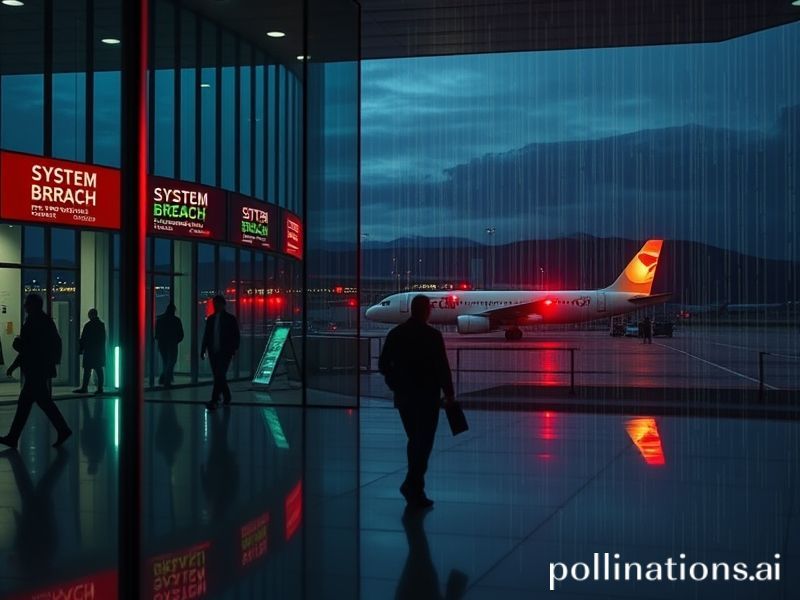Europe’s Airports Held Hostage: When Your Boarding Pass Becomes a Ransom Note
Schiphol, 05:47 a.m. local time: the departure boards flicker like a bad poker tell, then politely inform 70,000 passengers that their flights have been “re-accommodated to tomorrow, maybe.” Behind the scenes, ransomware—christened “Skytanic” by some under-caffeinated analyst—has locked down everything from baggage algorithms to the barista card readers. Welcome to the latest pan-European wake-up call: airports, those gleaming cathedrals of globalism, are now just oversized USB ports begging to be corrupted.
From Heathrow to Helsinki, a coordinated wave of intrusions has turned the continent’s hubs into very expensive waiting rooms. The modus operandi is textbook: spear-phish a subcontractor who still uses “Winter2024!” as a password, pivot through the network like a bored tourist on a 12-hour layover, and detonate malware that encrypts every flight plan short of paper origami. EU cyber-defenders, fresh from congratulating themselves on last month’s “landmark” joint press release, are now Googling the Cyrillic error messages flashing on their screens.
The timing is almost artistic. Summer travel demand is peaking, the Paris Olympics loom like an overpriced Airbnb, and everyone with a suitcase suddenly remembers that “digital transformation” also means “digital hostage-taking.” Cue scenes of stranded Americans discovering that EU passenger-rights vouchers don’t buy beer, and Chinese tour groups livestreaming their impromptu terminal camp-out to 20 million followers back home. If soft power is the ability to make others want what you have, this week Europe is exporting the irresistible allure of sleeping on a yoga mat next to a perfume kiosk.
Globally, the ripple is immediate. Oil traders, ever the sentimental bunch, bid up jet-fuel futures on the assumption that rerouted traffic equals longer flight paths equals more kerosene. Air-freight firms reroute pharmaceuticals through Dubai, because nothing says “life-saving medicine” like an extra 2,000-mile detour past the world’s largest indoor ski slope. Meanwhile, insurers discover a loophole excluding “acts of cyber” from business-interruption coverage, thereby transforming actuaries into philosophers of the absurd.
The attackers remain officially “unattributed,” which is Brussels-speak for “we have three guesses and two of them are NATO allies.” Analysts note similarities to the 2022 “Turla-meets-NotPetya” hybrid that taught Maersk the hard way that ships without software are just very large bath toys. Yet the real innovation is psychological: these intrusions didn’t steal credit-card numbers—they stole certainty. Air travel, humanity’s smug apex of punctuality, now feels as reliable as a Moscow weather forecast.
Cue the geopolitical theater. Washington offers “technical assistance” (read: our spyware is better than yours). Beijing reminds everyone that its airports still run on “secure” domestic code—never mind that half of it is copy-pasted from Stack Overflow. Moscow, with the straightest of faces, denies involvement while suggesting that if Europe simply paid more attention to “information security,” such misunderstandings wouldn’t happen. Somewhere in Pyongyang, an intern prints out the news for the Dear Leader’s bedtime reading and wonders if airports even exist in their own country.
Amid the chaos, one truth emerges: the cloud never forgets, but it does occasionally ransom itself. Passengers, those great unconsulted stakeholders of modernity, respond in the only way modern humans know how—by posting TikToks of snaking queues set to ironic lounge jazz. Their videos rack up millions of views, generating ad revenue that far exceeds the ransom demand, proving once again that in the attention economy, the hostage sometimes profits more than the kidnappers.
By Friday, Schiphol’s systems crawl back online after negotiators agree to a Bitcoin transfer roughly equivalent to the price of a single over-wing exit row seat. Flights resume, luggage is reunited with owners who’ve already bought replacement underwear in three countries, and EU ministers promise a “comprehensive strategic review”—French for “report due sometime after the next election.” Travelers, ever adaptable, update their packing lists: passport, boarding pass, and a fresh appreciation for the quaint inefficiency of paper.
After all, paper can’t be hacked. Yet.







